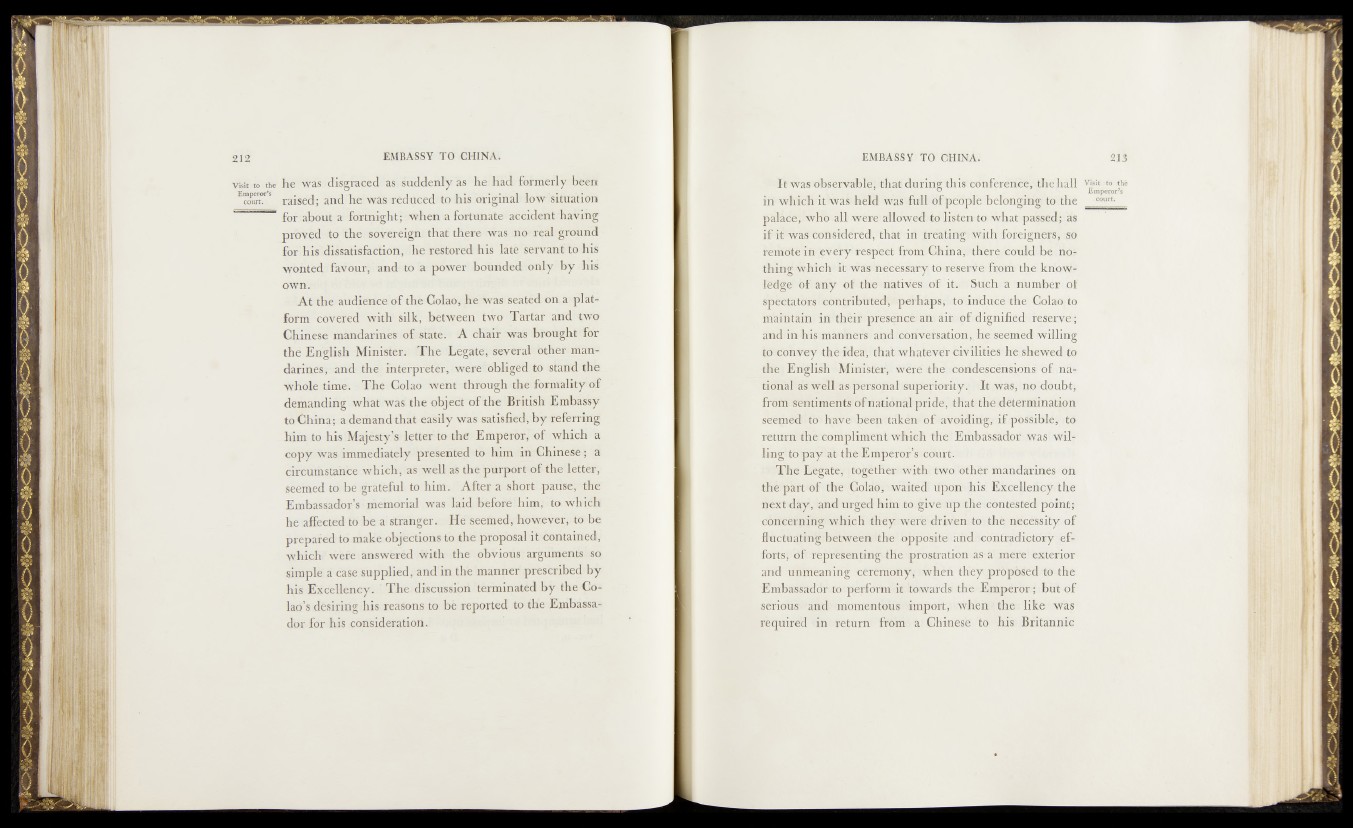
Visit to the
Emperor’s
court.
he was disgraced as suddenly as he had formerly been
raised; and he was rtódiiÉd*#) his 'original low situation
for about a fortnight] when a fortunate accident having
proved to the sovereign that there was no real ground
for his dissatisfaction, he restored his late servant to his
wonted favour, and to a power bounded only'by -Kis
own.
At the audience of the Colao, he was seated on a plat-
form covered with silk, between two Tartar and two
Chinese mandarines of. state. A chair was brought for
the English Minister. ffifeiLegate, several other mandarines,
and* the interpreter, were'obliged to stand the
whole time. The Colao went through the formality of
demanding what was the ohjcct of the British Embassy
to China; a demand that easily was satisfied, by referring
him to his 'Majesty’s letter to the Emperor, of wtóftltib.
copy was immediately-presented to him in Ghinese; a
circumstance which?; as well as the purport- of the letter,
seemed to be grateful to him. After a short pause, thé"
Embassador’s memorial was laid before him, do. whiêh
he affected to be a stranger. He seemed, however, to be
prepared to make objections to the proposal it contained^
•which were i answered with the obvious arguments sq
simple a case supplied, and in the manner prescribed by
his Excellency. { The discussion terminated by thé Co-
lap’s desiring his reasons to bè reported to the Embassador
for his consideration.
• >" ItWas "Observable'l .«thafi during this* ennfererKte:,’,^he half
in:Wh'ichiit%dS' held-Was fulbbfpeapleibelongiri'g fcoithe
pdlacetWno'all wer^SlloWGsd?td#fste,Ei‘to what passedp as
if i#wa^*feo®sMdred^ that' irl ^rea^h^Swithr^fforeigners1, so
remote in everyJrespseb froimCfeina^diWeffeould’ be no?
thingwhieh^it1 was 'tedbesteyj toreserdSaifrom the knbw-
-lVdgei o f any of thoinafriVes.i.oS it?./ Such» a number/of
^etfator«i,cdtitrib®tedlpfeperhapsd-i*to';induBdithe Colao to
maintain in theirspYfesqttdeYan) air,i^'fci|ignified5jfeseijiej|
and in his manner's^and conversation,phe'setemed willing
to'Convey the ldea', thatwhatevlir civilities hfeshewed to
the: English Minister]|wbre tthb;reorideseensipmss qfuna'y
tional as well astjjersonal superiority.; i It iwassino'jdoubt]
fronasefttiments oftnatibnal pifide, that»fthe determination
seemeddfb^haV^<henn:takenibfviaV,ettding', if (possible-, to
return thecompliment'which the'Embahsadorj was! wifi-
ling tOjpay!at the Emperof’s1 court. iI
pv The Eegatetoge th erf(wifrhs'I>wo;!©ther mandarines on
thelpkrt^of thevCola©,'waited! up,on^his. Excelled cyithb
hextd ay/ and? uir gedr hiin-stogive up the-eontested) point]
concerning which theyrwfere' drivieniioj the-‘nje’cbssiity of
fliictu ating .between- (the! bjrposite > and ccontradipteuy $@i!v
forts, dfi representingttHe.’sprostratiom-asek1 mefe* exterior
arid unmeaning cCrehabily,' when fhsey proposed to the
Embassador to perform it towards the Empeihri] | but of
serious?-’and'm omen to AUlpOr t, i ‘when; ft ifees like1 was
required »in' return fibmf^lf&hines'b io his Britannic
Visit ïtOpthè
Emperor’s